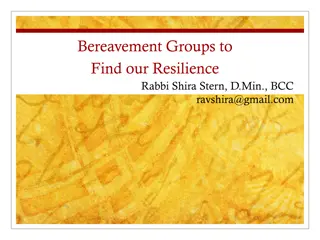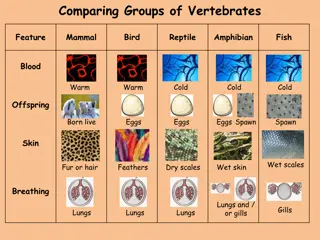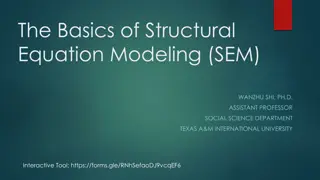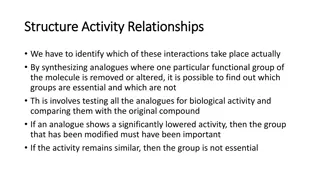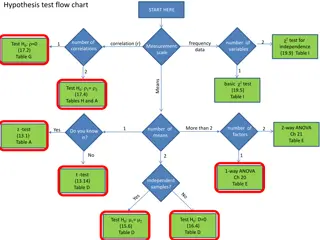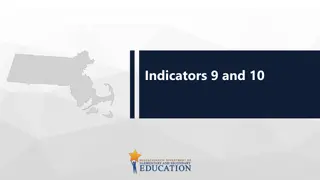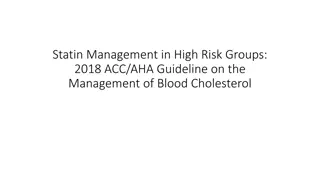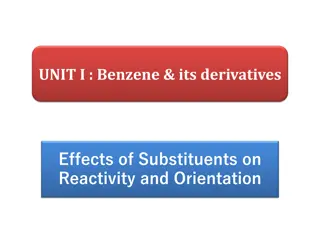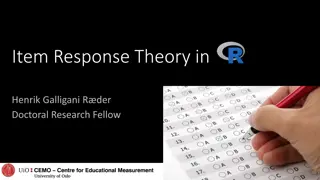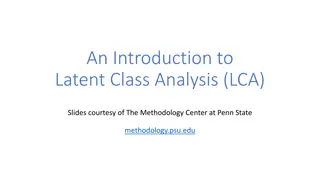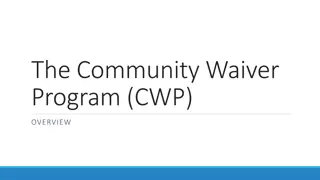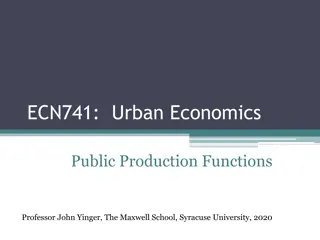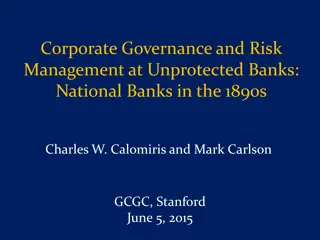How to Effectively Use Study Groups for Better Grades in High School and College
In this article, we\u2019ll unlock the secrets to forming and utilizing study groups effectively, whether you\u2019re looking for a high school study group to ace your next exam or a best college study group to conquer challenging coursework. Read full article https:\/\/explainlearning.com\/blog\/ho
2 views • 3 slides
Types of groups and reactions
This information discusses electron-donating groups (EDGs) and electron-withdrawing groups (EWGs), their effects on molecule reactivity, examples of each group, nucleophiles, and electrophiles. EDGs increase electron density, making nucleophiles stronger, while EWGs decrease electron density, making
0 views • 14 slides
Global Challenges Faced by Unreached People Groups
The top 20 unreached people groups face significant geographical, urban, ideological, social, and people challenges. The 10/40 Window encompasses areas with the highest concentration of unreached populations. Urbanization, diverse belief systems, social issues, and the lack of Christian presence con
0 views • 37 slides
Risk Assessment and Goal Setting for University Groups
Understanding how to perform a risk assessment is crucial for university groups to identify potential risks that could impact their goals and objectives. By considering possible outcomes, assessing risks, and setting achievable goals, these groups can minimize surprises and make informed decisions t
0 views • 12 slides
Understanding Grief and Finding Resilience in Bereavement Groups
Bereavement groups led by Rabbi Shira Stern offer support for those experiencing grief, highlighting the unique language of grief and the importance of allowing individuals to navigate their emotions. The journey of grief is explored through images and verses, depicting the stages of denial, anger,
4 views • 29 slides
Class Groups Are They the Future of Collaborative Learning
The traditional classroom setting, with rows of students facing a teacher at the front, has dominated education for centuries. However, the rise of technology and the evolving needs of the 21st century workforce are pushing the boundaries of learning. Enter Class Groups, a concept that reimagines th
4 views • 3 slides
Market Segmentation
Market segmentation involves breaking down potential buyers into groups to better understand their needs and behavior. By identifying market segments, businesses can tailor their products, services, and marketing strategies to target specific customer groups effectively. This approach helps in ident
2 views • 48 slides
Understanding Functional Groups in Organic Chemistry
Functional groups in organic chemistry are specific groups of atoms within molecules that determine the chemical properties of the compound. This content provides visual representations and descriptions of various functional groups such as alkanes, alkenes, alcohols, aldehydes, acids, and esters. Le
0 views • 38 slides
Comparing Groups of Vertebrates: Features and Differences
Explore the key characteristics of five groups of vertebrates - mammals, birds, reptiles, amphibians, and fish - including details on blood type, offspring, skin, and breathing apparatus. Learn about the unique traits that distinguish these vertebrate groups from one another.
0 views • 4 slides
Understanding Structural Equation Modeling (SEM) and Quality of Life Analysis
Structural Equation Modeling (SEM) is a statistical technique used to analyze relationships between variables, including quality of life factors such as physical health and mental well-being. Quality of life is a multidimensional concept encompassing various aspects like social relationships, living
0 views • 21 slides
Understanding the Binding Role of Alcohols and Phenols in Drug Molecules
The role of alcohols and phenols in drug molecules is crucial as they are frequently involved in hydrogen bonding interactions. By creating analogues with modified functional groups, such as ethers and esters, the importance of specific groups can be determined. The presence or absence of hydrogen b
2 views • 20 slides
Understanding Interest Groups and Political Parties in American Politics
Interest groups play a significant role in American politics, aiming to influence government decisions through lobbyists and various strategies. They represent different interests such as economic, public, and intergovernmental. Lobbyists engage with federal branches and judicial institutions, utili
0 views • 7 slides
Critique of Universal and Differentiated Citizenship
Universal citizenship embodies equality of rights for all citizens, while differentiated citizenship focuses on special representation rights for oppressed groups. Iris Marion Young criticizes the universalism in citizenship, advocating for differentiated citizenship to address the needs of marginal
2 views • 10 slides
Understanding Analysis of Variance (ANOVA) for Testing Multiple Group Differences
Testing for differences among three or more groups can be effectively done using Analysis of Variance (ANOVA). By focusing on variance between means, ANOVA allows for comparison of multiple groups while avoiding issues of dependence and multiple comparisons. Sir Ronald Fisher's ANOVA method provides
0 views • 28 slides
Analysis of Indicators 9 & 10 in Special Education Representation
The indicators 9 and 10 focus on the disproportionate representation of racial and ethnic groups in special education programs. Specifically, Indicator 9 looks at the overall disproportionate representation of groups eligible for special education, while Indicator 10 examines the disproportions with
1 views • 8 slides
Guideline for Statin Management in High-Risk Groups - 2018 ACC/AHA
This guideline outlines the management of blood cholesterol in high-risk groups according to the 2018 ACC/AHA recommendations. It discusses the overall approach, different statin management groups, justification for statin use in high-risk populations, high and moderate-intensity statin therapy, and
1 views • 14 slides
Understanding Effects of Substituents on Benzene Reactivity
Substituents on an aromatic ring impact reactivity and substitution orientation. Activating groups make benzene more reactive, while deactivating groups reduce reactivity. Ortho-para and meta directors guide future substitutions to specific positions. Examples of activating and deactivating groups a
0 views • 10 slides
Understanding Item Response Theory in Measurement Models
Item Response Theory (IRT) is a statistical measurement model used to describe the relationship between responses on a given item and the underlying trait being measured. It allows for indirectly measuring unobservable variables using indicators and provides advantages such as independent ability es
2 views • 32 slides
Understanding Interest Groups in Texas
Explore the role and influence of interest groups in Texas politics, including theories, types of groups, activities, and the impact of lobbying. Learn about incentives for joining, the free rider problem, and the various benefits interest groups offer. Discover the different types of interest group
0 views • 15 slides
Understanding Latent Class Analysis (LCA)
Latent Class Analysis (LCA) is a powerful statistical method for identifying subgroups within a population based on unobservable constructs. This method helps in addressing various research questions and can be applied to different types of data. Learn about the basic ideas, models, and applications
1 views • 33 slides
Understanding Latent Transition Analysis: A Comprehensive Overview
Latent Transition Analysis (LTA) is a statistical method that identifies unobservable groups within a population using observed variables, aiding in profiling individuals and tracking transitions over time. It is particularly useful for modeling categorical constructs, informing prevention and inter
0 views • 23 slides
Understanding the Role of Interest Groups in Politics
Interest groups are organizations with shared policy goals that influence the policy process. They differ from political parties as they focus on specific policies. Theories of interest group politics include pluralist, elite, and hyperpluralist perspectives. Hyperpluralism suggests that groups beco
0 views • 22 slides
Understanding Chemical Groups and Macromolecules in Biological Processes
In biological processes, certain chemical groups play crucial roles in molecular functions. These functional groups, including hydroxyl, carbonyl, carboxyl, amino, sulfhydryl, phosphate, and methyl, are essential for the structure and function of biological molecules. Additionally, macromolecules, s
0 views • 9 slides
Overview of the Community Waiver Program (CWP) and Enrollment Groups
The Community Waiver Program (CWP) aims to support full participation in communities, preserve natural living arrangements, and reduce waiting lists by offering targeted services to different enrollment groups. The program includes three authorities: 1915(c) Waiver, 1915(i) State Plan Amendment, and
0 views • 58 slides
Guidelines for Parent and Child Groups Under 5 Years Old
Parent and child groups for children under 5 provide a space for families to connect while children play freely or participate in structured activities. Sessions last for an hour or two with a maximum of 30 attendees. Indoor singing is limited to 6 adults, with good ventilation, while outdoor singin
2 views • 5 slides
Representation of Abstract Groups through Graphs
Explore the representation of abstract groups as automorphism groups of graphs, touching on topics such as the existence of graphs whose automorphism groups are isomorphic to given abstract groups, the cardinality of connected graphs satisfying specific properties, and questions regarding the cardin
0 views • 16 slides
Practical Approach to Using Groups and Teams in Classroom Settings
This workshop focuses on utilizing groups and teams in educational environments, providing techniques to form diverse and effective groups, outlining key principles, exploring low and high-risk activities, discussing different forms of peer assessment, and addressing challenges associated with group
0 views • 27 slides
Insights into Labour and Birth Among Marginalized Groups and Migrant Women
This content discusses new insights into socio-cultural phenomena surrounding labour and birth, particularly focusing on marginalized groups and migrant women. It includes details on sub-working groups, updates, and plans within this topic area, such as experiences of labour and birth, optimizing ch
0 views • 22 slides
Understanding Organic Chemistry: Functional Groups and Naming Rules
Delve into the world of organic chemistry with a focus on functional groups like alcohols, ethers, aldehydes, and ketones. Explore the rules for naming these compounds, understanding their structures, and how they impact the properties of molecules. From alcohols with hydroxy groups to ketones conta
0 views • 21 slides
Understanding Pressure Groups and Their Influence on Decision-Making
Pressure groups are formed by like-minded individuals to influence decision-makers by drawing attention to specific issues, with the aim of impacting legislation and existing laws. People join pressure groups seeking to address particular issues more effectively than through mainstream politics. Whi
0 views • 25 slides
Hierarchy of Housing Board and Covid-19 Response Groups
Focus on Covid-19 response with various groups established for coordination. Housing Board utilizes existing networks for input and feedback, encourages collaborative efforts among partners, and engages in consultations and projects. Addresses issues related to rough sleepers, vulnerable groups, and
0 views • 12 slides
Influence of Group and Culture on Human Personality Development
Society functions as a cohesive unit composed of smaller social groups that interact and shape individuals' psycho-social development. The difference between mechanical aggregates and psycho-social units lies in the emotional connections and responsibilities present in the latter. Groups like family
0 views • 8 slides
Understanding Urban Economics: Production Functions in Public Services
Production functions play a crucial role in analyzing the technology behind public production, with a focus on education production functions. Scholars and policymakers delve into the methodological complexities to comprehend the relationship between inputs like capital and labor and outputs like qu
0 views • 38 slides
Social Dialogue in Defense of Vulnerable Groups in Post-COVID-19 Labour Markets
The Lithuanian Centre for Social Sciences (LCSS) is hosting the DEFEN-CE project kickoff meeting at the University of Helsinki, focusing on social dialogue in defense of vulnerable groups in post-COVID-19 labor markets. The project aims to explore the role of social dialogue in addressing employment
0 views • 33 slides
Decode the Food Groups Challenge
Test your knowledge of food groups by decoding the names of different food groups based on hints provided for each. Identify the food groups where nutritious foods like oatmeal, mango, yogurt, soy milk, nuts, and spinach belong. Challenge yourself to decipher the encoded words and improve your under
0 views • 5 slides
Student Interest Group Policy Changes Overview
Student Interest Group Policy Changes involve implementing new criteria for student interest groups, setting membership requirements for preclinical and clinical years, consolidating existing groups, and establishing new interest groups. The policy includes guidelines on events, fundraisers, faculty
0 views • 9 slides
Understanding Latent Class Analysis: Estimation and Model Optimization
Latent Class Analysis (LCA) is a person-centered approach where individuals are assigned to different categories based on observed behaviors related to underlying categorical differences. The estimation problem in LCA involves estimating unobservable parameters using maximum likelihood approaches li
0 views • 30 slides
Understanding Cyclic Groups and Discrete Logarithms
Exploring the concepts of cyclic groups and discrete logarithms in group theory. This presentation covers the definition of generators, examples of cyclic groups, important theorems related to prime orders and cyclic groups, uniform sampling in cyclic groups, and the discrete logarithm problem. Exam
0 views • 14 slides
Risk Management and Corporate Governance in Banking Sector
Understanding the importance of risk management and corporate governance in banks, this content explores how banks raise funds, manage risk, and address default risks through a combination of assets and funding sources. It discusses strategies to align incentives, reduce rent extraction, and increas
0 views • 24 slides
Understanding Transformer Vector Groups in Transformer Systems
Transformer vector groups play a crucial role in determining the phase relationships between high and low voltage sides in transformer windings. Proper understanding of vector groups is essential for parallel connection of transformers to prevent phase differences and potential short circuits. The a
0 views • 36 slides




